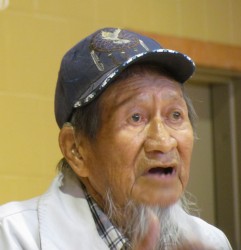Article Origin
Volume
Issue
Year
A federal court judge’s decision to overrule David Bearspaw’s extension as chief is clear indication that Stoney tribal custom was not recognized, said Elder Bill McLean, 90, former Chief and the oldest man on the Stoney reserve.
McLean visited his grandson Bearspaw the morning after he was first elected and told him, “I know and have experience of how hard it is to become a leader. You need advisors to help.”
A committee of Elders was formed to advise the newly elected chief.
Last year, said McLean, the committee discussed extension of Bearspaw’s term for two years and how to go about extending that term, whether through referendum, which is the white man’s way, or by Stoney traditional law. McLean said the committee spoke to almost all the members and the largest percentage wanted to extend Bearspaw’s term for two years, until December 2012.
The discussion came forward as a survey, the results of which were over-ruled by Federal Court Judge Richard Mosley in a 40-page decision brought down June 23. Mosley ruled that Bearspaw and his four councilors should have the scheduled December 2010 election and ordered them to leave office immediately. Mosley also called for an election within 60 days of his ruling.
McLean viewed this parting of ways between imposed decision-making at the federal level and First Nations ways as inevitable, looking back on decisions that were made decades prior to Bearspaw’s election as chief of the Bearspaw First Nation.
McLean attributed the divisiveness and resulting issues on the Stoney Nakoda Nation to the change in the electoral system that was imposed upon all First Nations in Canada in 1955. The Elders predicted that conflict would follow with the change to a two-year elected term for chief and councilors.
“With pay, everyone will want to become a councilor even though they don’t qualify,” said McLean.
When the proposed change to the electoral term was brought to the people by referendum in 1955, the Elders advised against adopting a two-year elected system, said McLean, who recalled the new system was accepted by slim majority. Acceptance of the new electoral system was divided along age lines. While the Elders thought the new system wouldn’t work, the younger people wanted it.
Prior to 1955, people picked leaders and also taught others to pick the best to become leaders. “Usually an honest person who knows everything in Nature would be chosen,” said McLean.
At the time, McLean was working as an interpreter for the Bearspaw band and council. Jacob Twoyoungmen, then Chief of the Chiniki, made a motion for the whole band: “Even though we take two years, we keep tribal custom.”
The motion, said McLean, meant that it was customary to seek advice from the Elders, who have experience and wisdom, on important issues.
However, as the young people started leaving the reserve to further their education, they fell away from the teachings of the Elders and tribal customs. McLean believes this is when the community started to fall apart.
McLean recalled the Elders said, “The young people are going to manipulate their own people, and they have seen it just that way as predicted.”
This is now playing out, he said, in what is happening on the Stoney Nation.
When the move was made to extend Bearspaw’s term as chief, a group from the Bearspaw band opposed the decision.
“Stoney tribal custom is very important,” said McLean.
“We need to re-educate young people, to start to have a traditional education system. We need to approach the education department of Indian Affairs to come up with a program for the process.”
McLean said the three bands that make up the Nation at Morley “are living in one cage with glass walls around each other” with no support between the three bands.
Current election terms vary for the three tribes that comprise the Stoney Nakoda Nation. Bearspaw members vote every two years, Chiniki every three years, and Wesley every four years. The Stoney Nakoda Nation, with just under 5,000 members is governed by the Stoney Tribal Council, which consists of three chiefs and 12 councilors – the entire elected body for each First Nation.
- 3799 views

